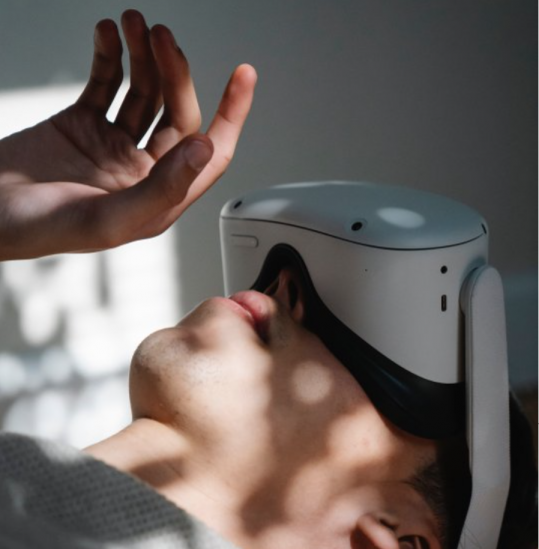A love triangle with a virtual lover

Does porn make holes in our brains?
No. This belief is based on studies that found that porn addicts have a lower grey matter volume. However, no one has confirmed a cause-and-effect relationship between brain defects and porn use. Which doesn’t mean your brain doesn’t respond to porn.
The structure and functioning of the brain correspond to a predisposition to certain types of behaviour. We know that compulsive sexual behaviour (e.g. compulsive viewing of pornography) is associated with disturbances in emotional regulation, difficulties in functioning in close relationships, in constant relationships, or coping with anxiety. In studies of compulsive porn users, we found differences in brain function compared to those who do not experience such problems. The brains of people who lose control over porn use react differently not so much to the sexual stimuli themselves as to the signals or situations that they predict. The part of the reward system that is responsible for motivating us to take pleasant actions begins to fail. It perceives life events related to stress or lower mood as a signal to watch pornography and to relieve tension.
For example, someone is left alone in the office and instead of working, they watch porn films because they always do it when no one is around.
Yes, their motivation system, instead of keeping them on the assumed course until they finish their work, starts to force them to watch porn and masturbate. It causes a feeling of losing control, and at the same time we observe a tendency to look for a stimulus, to react. This increased seeking for an opportunity is similar to what happens with compulsive gamblers.
We also investigated treatment options for addicts.
Is it difficult to treat this addiction?
So far, there are no widely accepted treatment guidelines. There is little data on the use of drugs. They can work by regulating mood, reducing impulsiveness, compulsiveness, acting on the so-called reward centre. We assessed the effectiveness of drugs in accordance with the highest standards: a randomised (with random selection of patients), double-blind study (both researchers and patients during therapy do not know whether they are using an active substance or a placebo). We controlled it with functional brain imaging. We can conclude that all kinds of interventions (therapeutic and pharmacological) were meaningful. Improvement was seen in patients taking drugs that affect both the anxiety mechanism, the compulsive mechanism and the one related to the reward system in the brain. The placebo effect is also important – we can understand this as a large role of motivation in the treatment of addiction. There are specific changes in brain reactivity associated with the use of individual drugs, and this data is currently being analysed.
We should remember that a few years ago the WHO included compulsive pornography in the list of diseases. You could say: will we have a cure for it soon?
I wouldn’t dare to call it that. Sexually compulsive patients have different profiles and different treatment needs. We also need to understand why certain interventions, drugs help some patients more than others. This requires extensive research.
When talking to sexologists, I hear two quite contradictory opinions. Some say: we fetishise porn too much, it is not harmful at all. Others: pornography kills sex and affects the quality of intimate life very badly. What is your opinion?
The group of patients we study should not be the basis for answering this question. They have already experienced negative consequences and confirm that pornography is harmful to them. However, let us consider the scale of the phenomenon. Sexual content is the most searched for thing on the web. During our conversation, over a dozen or tens of thousands of people around the world are watching pornography on the Internet. And the rates have increased during the pandemic. Given the widespread use of pornography (at least half of men and a quarter of women do so repeatedly), remember that only a relatively small proportion of people are affected by the problem of losing control. In particularly predisposed individuals, pornography becomes a form of coping with difficulties in social contacts, shyness, and difficulty in entering into emotional-sexual relations.
Porn addiction is sometimes compared to alcohol addiction. The problem is that 12-year-old children do not start their adventure with alcohol, but – as it turns out – with pornography.
So the earlier exposure to pornography, the more likely you are to become addicted in the future? Or rather become a more zealous user?
Yes, we can assume that the earlier the exposure to pornography, the greater the likelihood of difficulties in future sex life. Because earlier exposure is also associated with a lower probability of effective interaction of other sources of sex education. This usually applies to people who do not yet have sexual relationships, have no corrective sexual experiences, and shape their imaginations and ideas about sex based on pornographic images.
We should remember that the main problem is the dramatic deficit in sexual education.
We already know that technical attempts to limit access to pornography do not make much sense because any barrier can usually be quickly circumvented. Therefore, the main idea of combating the negative impact of pornography should be appropriate and early education, awareness and correction of various patterns that result from both pornography and sometimes various unfavourable, traumatic sexual experiences or observing pathologies in the immediate environment. Are such people more prone to compulsive sexual behaviour? We can suspect that such a relationship exists. As pornography becomes more and more used as a means of achieving quick and easy pleasure, it becomes difficult to engage in sexual relationships with other people and thus pornography with masturbation may become the main form of sexual activity. There is little scientific data on this subject, and for formal and methodological reasons it is difficult to research and observe pornography use among children. There are also no high-quality retrospective studies on the sexuality of people depending on the age of first exposure to pornographic materials and the frequency of their use.
What will the future of pornography consumption be? Will the quality of sex drop dramatically?
Its consumption is growing, also due to the available broadband Internet and smartphones, which are slowly replacing traditional computers in using Internet resources, including pornography. We can expect that increasingly advanced cybersex technologies will become available, more and more closely mimicking sexual interaction with another person. Also by creating a virtual partner in any way. The attractiveness of these forms may become more and more addictive for users. Virtual sex will grow more and more. In the world, humans are already formalising relationships with robots.
What does this mean for long-term relationships?
Much more sexual needs can be met through new technologies. But despite the availability of pornography, the value of interpersonal relationships has not been devalued all that much. People still want to form relationships with other living people. We do not know, however, to what extent the availability of virtual sex will affect the patterns of erotic relationships, e.g. creating open relationships with the introduction of a virtual partner. Maybe hybrid love triangles will be created?
It sounds more and more interesting.
Undoubtedly, the increasing consumption of sexual images or other, even more technically advanced forms of communing with constantly new, freely created sexual partners can significantly affect the fact that our ordinary partner (unable to change like a virtual creature into a new person, fulfilling the most demanding erotic scenarios) will become sexually less attractive.
The need for closeness and tenderness is universal for man. Porn is unlikely to do that. Where do porn addicts find closeness and tenderness, or maybe they just stop needing it?
Pornography certainly does not satisfy this need. The best technically constructed virtual partner will not fulfil this task at this stage. So there will be a deficit area. If at the same time creating relationships with other people, the ability to establish such relationships or the motivation to strive for them are denied, then the feeling of loss is enormous. We should remember that people who experience sexual compulsivity sooner or later usually experience an acute lack of a close relationship and the ability to combine emotional commitment with sexual satisfaction. In the long run, a pornographic scenario will not work.


